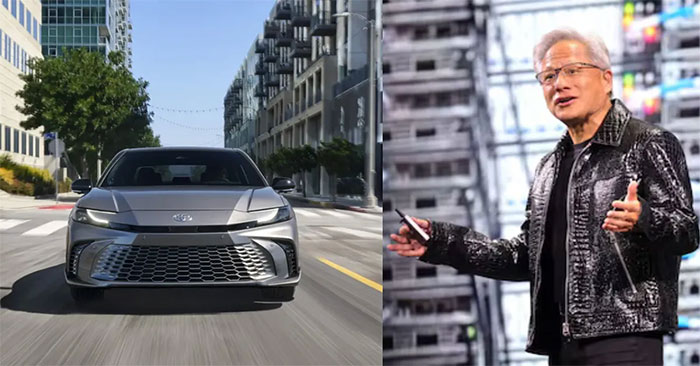Nvidia will support Toyota in developing self-driving cars
Nvidia has had a banner year, but it seems the company's ambitions extend beyond its traditional businesses. At CES 2025, Nvidia CEO Jensen Huang revealed plans to enter the automotive industry for the first time. Of course, 'Team Green' won't be directly manufacturing cars, but will mostly be involved in the supply chain of high-end computer hardware and software components in cars.

That master plan doesn't just include the launch of new automotive-focused GPUs; it also includes the expansion of its vehicle-focused software, DriveOS. In fact, Nvidia has already struck deals with some of the industry's leading partners to develop next-generation vehicles using DriveOS, including Toyota.
First, it's worth noting that DriveOS isn't necessarily focused on infotainment software. Instead, it's an autonomous driving assistant that will essentially serve as the foundation for Toyota's self-driving ambitions. According to Nvidia, the goal of DriveOS is to provide real-time, secure AI processing and integrate that processing into other software in the car.
In fact, Nvidia has been eyeing the software side of autonomous driving for quite some time, under a project the company calls Cosmos. Cosmos works in tandem with another Nvidia project called Omniverse, a physics simulation engine that creates simulations that Cosmos then uses to turn into photorealistic images for training AI systems. Essentially, Nvidia is creating scenarios to train its AI systems in, rather than having to do millions of miles of real-world training.
The partnership between Nvidia and Toyota isn't new. Toyota has been working with Nvidia for some time, primarily using the company's DGX supercomputer to train AI models for future versions of its self-driving cars. In 2019, the Toyota Research Institute began using Nvidia's technology to develop, train, and validate its self-driving technology. The new agreement will allow Toyota to use Nvidia's AGX AI computer, the current generation of which is called Thor AGX.
Toyota is currently lagging behind its rivals when it comes to adopting new driver assistance technologies, largely due to the company's slow rollout of pure electric vehicles. That's something Nvidia will be able to help with in a big way. Big chipmakers are going to play an increasingly important role in the auto industry, whether it's by powering the processing behind all the data that sensors are collecting or by providing a smooth and responsive software experience for consumers.